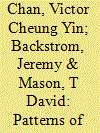| Srl | Item |
| 1 |
ID:
134439


|
|
|
|
|
| Summary/Abstract |
Since the Tiananmen Square protests of 1989, there have been no national protest movements in the People's Republic of China (PRC). This is the longest period in the history of the PRC without a major national protest movement. Nonetheless, the number of small, local protests or “mass incidents” (as they are termed by the Chinese government) has increased from 9,000 a year in 1994 to over 180,000 in 2010. Most of these incidents target local party and government agencies and/or local firms. Protests by peasants are often motivated by land confiscation by local governments, while worker protests are often over firm treatment of works (including pay, benefits, and job security). More general protests arise over what participants perceive as unfair and illegal extractions of fines, fees, and other payments by local government and party units. We present a theoretical argument on how grievances and mobilization capacity affect the likelihood of protests occurring in a locale. We then test propositions derived from this theory with provincial level data for the period 1995–2010. This study represents one of the first to test predictors of the frequency of mass incidents at the province level.
|
|
|
|
|
|
|
|
|
|
|
|
|
|
|
|
| 2 |
ID:
141824


|
|
|
|
|
| Summary/Abstract |
As new academic journals have emerged in political science and existing journals experience increasing submission rates, editors are concerned that scholars experience “reviewer fatigue.” Editors often assume that an overload of requests to review makes scholars less willing to perform the anonymous yet time-consuming tasks associated with reviewing manuscripts. To date, there has not been a systematic investigation of the reasons why scholars decline to review. We empirically investigated the rate at which scholars accept or decline to review, as well as the reasons they gave for declining. We found that reviewer fatigue is only one of several reasons why scholars decline to review. The evidence suggests that scholars are willing to review but that they also lead busy professional and personal lives.
|
|
|
|
|
|
|
|
|
|
|
|
|
|
|
|